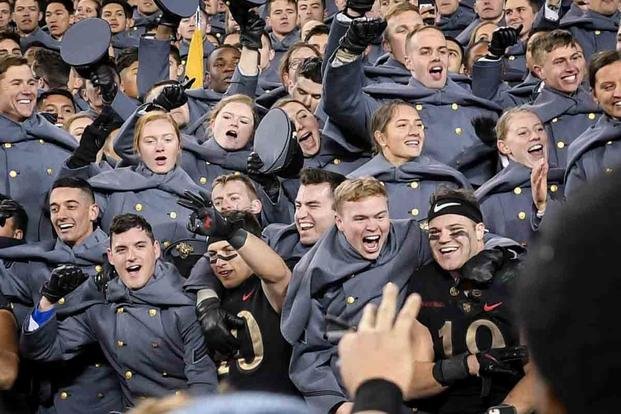Neither the Black Knights nor the Midshipmen have cracked the AP Top 10 College Football Poll in decades. And the Army-Navy Game is not going to decide the NCAA FBS Championship. Some years, the Army-Navy Game doesn't even decide who gets the Commander-In-Chief's Trophy, for which the three service academies (along with Air Force) compete.
Yet during every college football season, somewhere between the end of the regular season play and the upcoming deluge of bowl games, Army meets Navy at a neutral location. And while the two sides battle it out, they take center stage as the only football game on television the first Saturday afternoon in December. With between seven to eight million people watching, it is annually one of the top-rated events on television for that week.
But if the game decides nothing beyond bragging rights, why does America tune in en masse to watch the Black Knights and Midshipmen duke it out year after year?
We spent time on the Army-Navy game’s 2022 media row, asking some of the people closest to the game for their thoughts.
Pete Medhurst, Play-By-Play Commentator, U.S. Naval Academy
"I think Army-Navy is still college football in its purest form," says Medhurst. "There's a lot of people out there that still like that form of football. And let's face it, knowing that kids are signing up for something greater than football, you know, upon graduation, they're gonna go serve a minimum of five years to help protect our freedom. I think people have a soft spot for those players and wanna root those kids on."
Rich DeMarco, Play-By-Play Commentator, U.S. Military Academy
"It's a throwback really. It's a throwback to what, you know, college football was," DeMarco tells Military.com. "I think it's something everyone can enjoy, right? I think you can be an Oklahoma fan and feel good about watching Army and Navy. I'm not sure there's any other game that doesn't involve the top-ranked teams that just have an interest where you just wanna watch it, you wanna be a part of it.”
"And then there's the fact that a lot of families have somebody that's either been in the Army or been in the Navy. They have that tie-in as an enlisted service member and it gives them someone to root for in the game."
Lt. Gen. Steven W. Gilland, U.S. Military Academy Superintendent
"It's two things. One: tradition, and what the two institutions bring when they get to the football field and what the game is," says Gilland. "But really second and, most importantly, is that both football teams are representing their respective service academies that represent our services.
"These are the young men and women that are leading our nation in our future, the next generation. I think that's really what you see as they go out there and demonstrate grit, overcome adversity, tenacity, perseverance as they go head to head."
Vice Adm. Sean Buck, U.S. Naval Academy Superintendent
"I think the Army-Navy game is what 'right' looks like, and I think the American public, when they see it, they're reassured that everything's good in this nation," Buck says. "When they see the men and women who serve in the academies and the men that go out and play a sport like the Army-Navy football game. It's what 'right' looks like. And that's what we need as a nation."
Keenan Reynolds, Former Navy Quarterback
"There are service members everywhere that watch this game no matter what time of day it is," says Reynolds, who recently had his number retired at the Naval Academy. "They may be a Georgia fan, a Texas fan or whatever, but I guarantee you, along their family tree, they have someone that may have served.
“So I think that despite them not necessarily being, you know, avid followers of Army or Navy football, that connection to past service in their family is what brings them together when this game comes on."
Sgt. Maj. of the Army Michael A. Grinston
"These are America's future warriors." Grinston tells Miltary.com. "People aren't just watching a football game, they're supporting the future of the Army and the Navy. We're your Army. People want to see us battle it out, but afterward they want to see that we're on the same side.
Wayne Peacock, CEO, USAA
"I think it's special and bigger because it represents folks on the field who are going to switch those uniforms out and put on a different uniform," Peacock says. "To go put themselves in harm's way and defend our freedom."
"It really does represent what's right and what's good about America. I think the ability to showcase the athletes and the academies more broadly is really important for our country and a really important tradition for us to uphold."
Dan Rickert, West Point Graduate
"For me, it's the game the men on the field represent," says Rickert, who is now the Chief of Staff for Global Defense at software company Palantir. "I think the values of our country show and you don't necessarily see that in a lot of sports, frankly. These men are going to play this game and then go serve their country, and I think that's really inspiring for a lot of people."
-- Blake Stilwell can be reached at blake.stilwell@military.com. He can also be found on Twitter @blakestilwell or on Facebook.
Want to Learn More About Military Life?
Whether you're thinking of joining the military, looking for post-military careers or keeping up with military life and benefits, Military.com has you covered. Subscribe to Military.com to have military news, updates and resources delivered directly to your inbox.

















